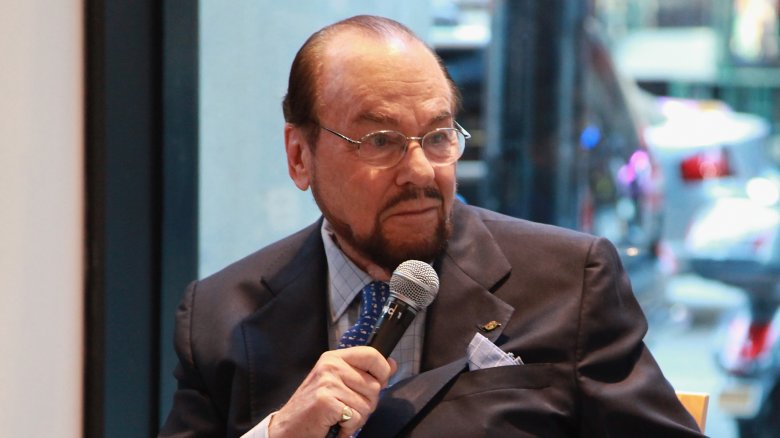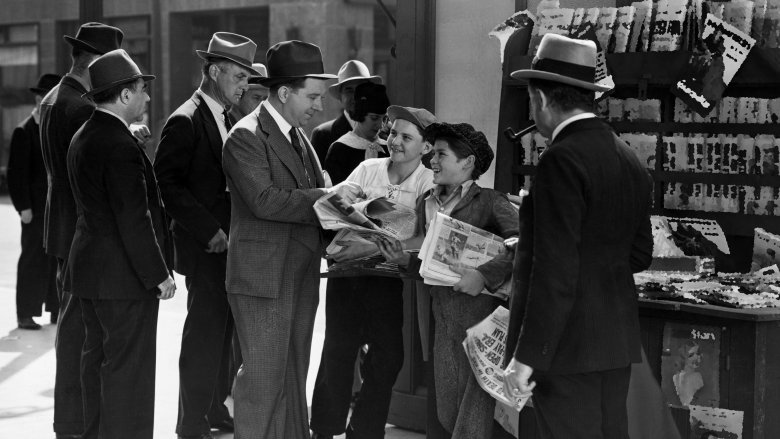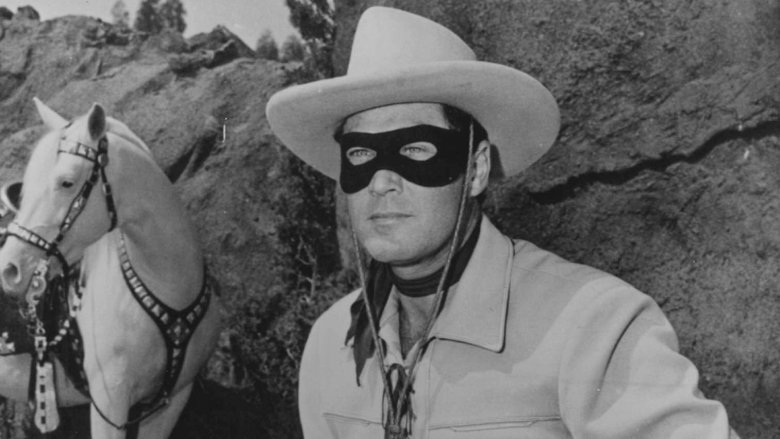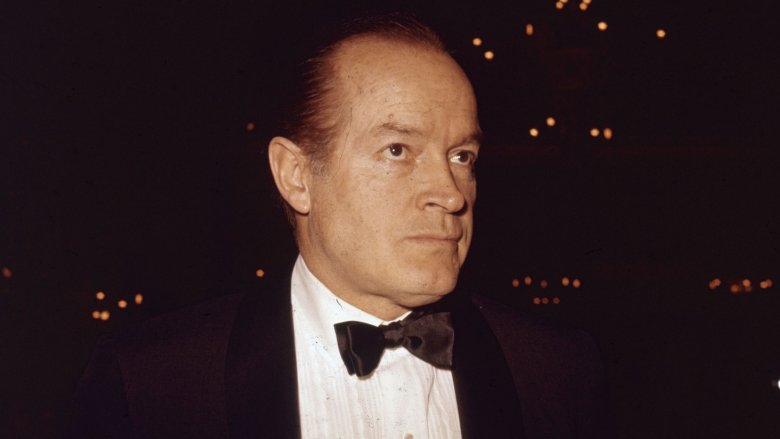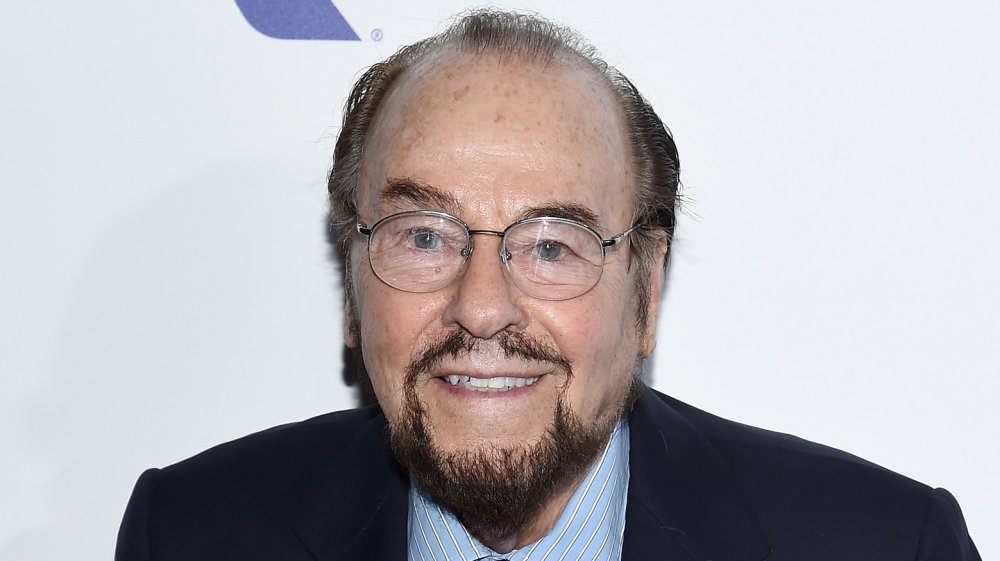James Lipton's Crazy Real-Life Story
You probably knew James Lipton from his long-running TV show Inside the Actors Studio on the Bravo network or for his appearances on The Simpsons, Family Guy, and Arrested Development. Or maybe you just thought of him as "that snooty guy with the beard." His notoriously pompous public persona and fawning interviews with Hollywood celebs have been imitated, mocked, and even ridiculed by many, including Will Ferrell on Saturday Night Live and David Cross on both Mr. Show and in his stand-up special, The Pride is Back.
Lipton hung around a long time — and much longer than you might think. This may come as a surprise, but he made it all the way to 93. Lipton packed a lot of life into the near-century he lived on the planet Earth. He traveled the world and had all sorts of adventures, in addition to interviewing many of the world's most famous actors and actresses alongside a tall stack of blue cards. Here are some wild tales about the man behind that legendary beard.
His father ran out on him and later became a beatnik
James Lipton was born in Detroit in 1926, where his father, Lawrence, worked as a journalist. His work appeared in publications like Atlantic Monthly, The Quarterly Review of Literature, and The Chicago Review. Sadly, Lipton's parents divorced when he was still a kid and Lawrence stopped financially supporting his young son.
Lawrence went on to become a paperback writer and wrote a series of mystery novels throughout the 1930s and 1940s. As America's beatnik culture emerged following World War II, Lawrence Lipton became infatuated with it. He became a beat poet and even wrote a beatnik book titled The Holy Barbarians in 1959. His ties to beat culture were strong enough that they landed him the role of a character called "The King of the Beatniks" in a 1960 horror film called The Hypnotic Eye. Later, he wrote The Erotic Revolution, a 1965 book that contained what was then considered some quite bold opinions on homosexuality, contraceptives, and abortions.
Unsurprisingly, Lipton didn't like to talk about his father and often shied away from questions about him during interviews. During one with The Philadelphia Inquirer in 2002, he said, "I saw him when I was 12 and again when I was 20." The interviewer remarked that Lipton showed "no tears, no hint of emotion other than resolve" before stating that he didn't want to discuss his father any further.
Lipton was a child genius
Even when he was barely old enough to use a potty without adult supervision, Lipton was something of a child genius. Just ask him! According to profiles about him on NPR and in the pages of The New York Times, Lipton claims he could read before he was 2 years old.
His literary skills quickly developed into a love for poetry. He supposedly started writing his own poems at 3. By the age of 12, he claimed he had three full novels under his belt. Not half bad for a kid living on the edge of poverty in Detroit while being raised by a single mother.
Not that his (incredibly) early works were worthy of publication or further discussion, though. The Los Angeles Times asked him about the subject matter of the novels in 2013 and he said, "I would normally say that modesty forbids me from telling you, but it's shame."
He started officially working at only 13
James Lipton entered the working world when he was merely 13. Money was tight after his father abandoned him and his mother, so he started working pretty much as soon as he was old enough. Lipton got a job as a copy boy at The Detroit Times. There he would deliver articles right after they were finished or came in via wire service teletype machines to the desks of the paper's editors so they could get them published in time for "the bulldog," the first edition of the following newsday.
In his autobiography, Inside Inside, Lipton wrote that one of the paper's editors became "one of the heroes of my life" for his steadfast opposition to the editor-in-chief's efforts to kill important stories that might upset advertisers. While juggling his schoolwork and duties at The Detroit Times, Lipton also managed to land a second job at the Catholic Theater of Detroit. It was his first acting gig and the beginning of his career in the world of entertainment.
James Lipton used to be the Lone Ranger's nephew
James Lipton's big break came when he landed the role of the voice of Dan Reid in a radio version of The Lone Ranger back in 1944. Reid was the titular character's nephew and, in one of the first examples of a creator building a "shared universe," it was later revealed that Dan is the father of Britt Reid, better known as The Green Hornet.
The show was broadcast live, so there was never any time for do-overs, and a single mistake could send the entire production into a tailspin. The second after the engineer lifted the needle on a record playing "The William Tell Overture," they were on the air.
Lipton appeared on the show every few days and mocked how his voice sounded at the time in his autobiography. "Three times a week, [Tonto], the Lone Ranger, and I rode off into the sunset with a hearty 'Hi-yo, Silver!,' 'Gittum up, Scout!,' and, from me, in an obbligato a full octave above them, 'Come on, Victor!'"
He tried to become a lawyer, but wrote a lousy Broadway musical instead
Eventually, Lipton decided he wanted to pursue a practical career instead of sticking with acting. A lot of this was due to his father's legacy, according to an interview he gave to Parade in 2013. "I was going to be a lawyer because that was as far away from my father's lunacy that I could imagine," Lipton said. "He was nuts. He abandoned us. I was afraid of being like that."
But law school costs money, and Lipton had to find a way to pay for tuition once he arrived in New York City to begin his studies. Since he had some acting experience, he went back to acting. To further improve his skills and marketability, he turned to Broadway and Hollywood vet Stella Adler, the founder of the Stella Adler Studio of Acting. She accepted him as a student.
This led to Lipton's later gigs in soap operas and on Broadway, which included Sherry!, an ill-fated musical adaptation of The Man Who Came to Dinner for which he wrote the book and lyrics. Its orchestrations were thought to have been destroyed when it flopped in 1967, but it was later discovered in a trunk at the Smithsonian over 30 years later. By this time, Lipton had begun hosting Inside the Actors Studio and cheekily got together some of his famous colleagues to make a recording of the musical's songs. Mike Myers, Carol Burnett, and Nathan Lane are among those who participated.
A pimp in Paris?
Following his initial experiences in New York City, Lipton's career led him to Europe. But when things weren't working out for him as an actor in Paris in the 1950s, he found work in a different profession: as he revealed in Inside Inside, he actually worked as a pimp. Lipton explained everything in the 2013 Parade interview. The city was still suffering after World War II and work was hard to find for men and even more difficult for women. Many made the difficult choice to become prostitutes, a profession that was legal and regulated in France at the time.
His savings were running low and Lipton was mulling over the possibility of returning to the United States when a female friend, who just so happened to be a prostitute, told him he should get a job at the bordello where she worked. "She arranged for me to do it," he said. "I had to be okayed by the underworld; otherwise they would've found me floating in the Seine."
Lipton claimed he represented the entire bordello and "did a roaring business." He also admitted that "it was a different time." In an interview with The Today Show's Matt Lauer a few days after the Parade article was published, he clarified about the kind of work he did in Paris.
Lipton preferred the French term "mec." "A pimp exploits and often abuses his women," he explained. "And it's just the reverse with a 'mec.' A 'mec' works for his women."
He escaped a Greek film production, and his producer shoved a car into the sea
In the '60s, James Lipton landed the lead role in a movie called Wheel of Fire that sent him to Athens. The production was plagued with problems primarily caused by Greece's beleaguered national government and an endless storm of bureaucrats who kept trying to shake down the producer for more money. As the production ground to a halt, he lent Lipton his car so he could go on a trip around Greece until it all got sorted out.
As he recalled in Inside Inside, Lipton befriended a Greek woman who was fleeing an arranged marriage to a wealthy businessman. Together with her and her friends, they toured the country and spent time at a bizarre hotel in Delphi housed in a series of caves. Later in Sparta, Lipton hung out with a group of friendly shepherds who gave him a hand-carved crook that he later hung up in his study to remind him of his wild times in Greece.
Eventually, Lipton returned to Athens where he learned that the doomed film had been cancelled. His immensely frustrated producer, in a fit of rage, shoved the car he'd loaned to Lipton off a pier into the Aegean Sea, where it may still be to this very day. As for the fate of Lipton's female friend, she eventually managed to convince her family to call off the marriage.
Quite the Lark
Along with Sherry!, Lipton also used his skills as a wordsmith to write a pretty unusual book that was originally published in the late '60s and has remained in print in the many years since. Titled An Exaltation of Larks, the book tackles the strange subject of the terms of venery. As Atlas Obscura explains in a 2015 rundown, these were originally terms that were used to describe groups of animals or even humans back in the Middle Ages. If you've ever wondered where "murder of crows" or "gaggle of geese" comes from, you can probably point the finger at a bunch of hunters that came up with them hundreds of years ago.
Lipton developed an interest in the subject and decided to write about the terms of venery based on various medieval texts. He even tossed in several terms of his own creation. Here's just a few: "a complex of psychoanalysts," "a failing of students," and "an unction of undertakers."
He used to wander the streets at night with Bob Hope
When James Lipton was a kid, Bob Hope was one of America's most famous comedians. He once managed to track Hope down near the stage door at Detroit's Michigan Theater, where he was getting hounded for autographs. While Hope frantically signed them as quickly as possible, Lipton was determined to get him to actually look at him. He asked Hope, "how much do you think this autograph is worth?" It did the trick.
Decades later, Lipton wound up working with Hope on what would become several TV specials for NBC that were filmed all around the globe. Hope had become quite the night owl by this point in his life. He'd typically begin business meetings with Lipton at 8 p.m. They'd usually run until midnight. That's when Hope would badger Lipton to go on long walks with him wherever they were at the time.
Often that was Los Angeles, but they also wandered the streets of Beijing and other exotic locales. During these late night treks, Hope enjoyed rolling out bawdy tales of various Hollywood stars and their sexy shenanigans in the bungalows at the Beverly Hills Hilton, as Lipton revealed in a blog post for Bravo's website. Sometimes they talked about more serious topics like nightmares. Hope once revealed that he had recurring ones about becoming poor. "[The fear] never goes away," he told Lipton.
James Lipton almost crashed a plane in Alaska
Despite being an actor first, James Lipton also served in the Air Force in the mid-'40s, which kicked-off his lifelong interest in aviation. He'd racked up 1,000 hours of flight time as of 2013 after 30 years of recreational flying, according to The Aircraft Owners and Pilots Association.
His adventures in the skies didn't always go smoothly, however. While preparing for a TV movie set in Alaska for ABC, Lipton decided to visit the "Land of the Midnight Sun" himself in December 1989. He recruited a 70-something bush pilot with the handle "The Bald Eagle of the Yukon" to take him up in the air to scout for locations in a rural region. They boarded a 1956 Aeronca 15 AC Sedan that was in pretty sad shape, according to a chapter in Inside Inside. Among other things, one of the doors had to be held closed during takeoffs and landings so it wouldn't pop open.
Mr. Bald Eagle of the Yukon allowed Lipton take in midair over once they were on their way to McGrath, a gold-mining town. As they flew over the Iditarod Trail, they hit a snowstorm and Lipton's visibility rapidly dropped. Then the engine cut out and they started drifting toward the side of a canyon. The problem was a blocked gas line that corrected itself and the duo eventually made it to their destination in one piece.
James Lipton passed away in March 2020
James Lipton lived a long, full life — several long, full lives, actually — and he started to wind things down only when he reached his nineties. In 2018, when his professional baby, Inside the Actors Studio, ended its 20-year-plus run on Bravo for a jump to Ovation, Lipton decided to bow out. After one last stab in 2019 at his Arrested Development recurring role of Warden Gentles, Lipton retreated from public view, but made headlines one more time, in 2020. Sadly, it was on the occasion of his death. According to a statement from Lipton's wife to The Hollywood Reporter, the man of many talents passed away early in the hours of March 2, 2020, succumbing to the effects of bladder cancer. "He lived each day as if it were his last. His work was his passion, loved what he did and all the people he worked with," Kedaki Mercedes Lipton said. "He empowered people to do their best, and hopefully his spirit, curiosity, and passion will live on." Lipton was 93.
